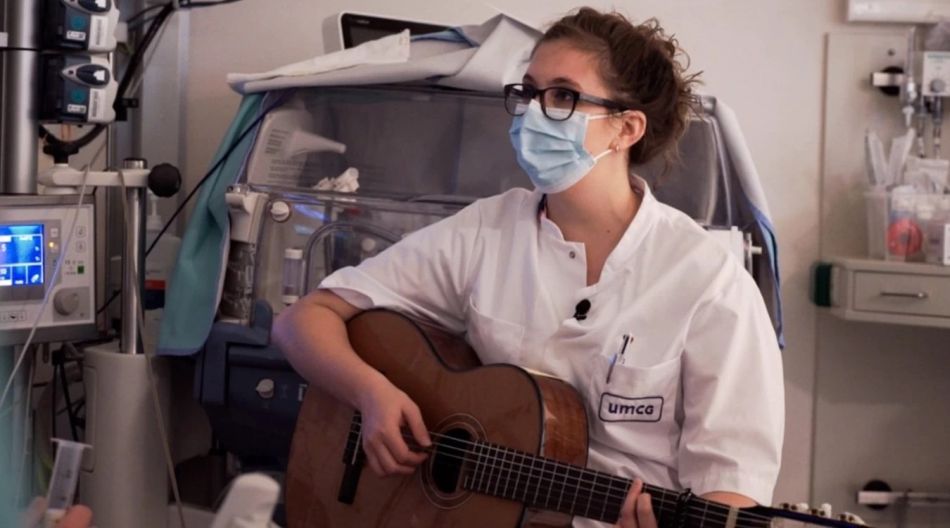Music therapy is a benefit for preterm born babies and their parents
Music therapy on the neonatology ward improves the functioning of the central nervous system of preterm born babies. It also has a soothing, relaxing and stimulating effect on them. Music therapy is safe to use and both parents and nurses consider it a valuable addition to neonatal care. This follows from research by Hanneke van Dokkum of the UMCG. Music therapy is an important step in reducing developmental problems in neonates, she concludes. She will receive her doctorate on February 8 at the University of Groningen based on the results of her thesis.
When children are born before the 30th week of pregnancy, an important phase in brain development occurs outside the womb. Preterm birth has major consequences for the child’s neurodevelopment. Despite major medical and technological advances in neonatology, developmental problems in this group remain a significant challenge. The goal of Hanneke van Dokkum’s dissertation was to take a major step forward in reducing developmental problems in preterm born infants. To this end, she examined, among other things, the effect of music therapy on the neonatology ward.

Live music therapy by certified music therapist
Since 2018, newborns at the UMCG can receive music therapy on the neonatology ward. This is always started in close cooperation with parents. The music therapy in the UMCG is live-performed and is provided by a certified music therapist. For example, the music therapist plays guitar, sings or hums for the newborns. In her study, Hanneke van Dokkum investigated the feasibility and applicability of music therapy. All children were able to receive music therapy without overstimulation. Parents were often present during the sessions, and they were very satisfied with the music therapy. Nurses were also satisfied and reported that the ward became quieter during music therapy.
Positive effect on baby movements and the brain
The study found that music therapy had a positive effect on the quality of newborns’ movements, which reflect the developing central nervous system. It was also found to influence the children’s brain activity; the brain could become both more active and less active during music therapy. It was also found that the amount of oxygen in the brain fluctuated less during music therapy than before and after.
An asset for parents as well
Hanneke van Dokkum also investigated whether music therapy affected mothers of preterm born babies. Mothers who received music therapy experienced less anxiety than mothers of newborns who did not receive music therapy. Van Dokkum: “Offering music therapy to mother and child during admission to the NICU therefore seems to be beneficial for both”. A form of music therapy developed specifically for parents appears to support them in situations surrounding death, as well as in parent-child bonding. In this therapy, the recorded heartbeat of the child forms the basis for a piece of music that can be played both in and outside the hospital. Music therapy therefore seems to have great added value for both parent and child during admission to the neonatology ward.
‘Use music therapy both before and after delivery’
According to Van Dokkum, music therapy can be safely applied to the smallest preterm born babies. Van Dokkum: ‘Music therapy likely leads to improved developmental outcomes through brain activation, stress reduction, improved parent-child interaction and enrichment of the environment with music sounds that mimic the natural environment of a baby in the mother’s womb.’ Van Dokkum advocates wider use of music therapy as an early intervention during pregnancy and in the NICU. ‘It can relieve stress and help promote parent-child interaction’. Monitoring the brain development of premature infants should be a top priority, she says, both before and after birth, in order to improve neurodevelopmental outcomes of premature infants.
Curriculum vitae
Hanneke van Dokkum (1995, born in Winschoten) studied Medicine at the University of Groningen. She performed her research at the Department of Neonatology of the UMCG. The title of her dissertation is Towards improving neurodevelopmental outcomes in preterm infants: efforts during NICU stay and beyond. She now works at Deventer Hospital as resident not in training (ANIOS) Pediatrics.
